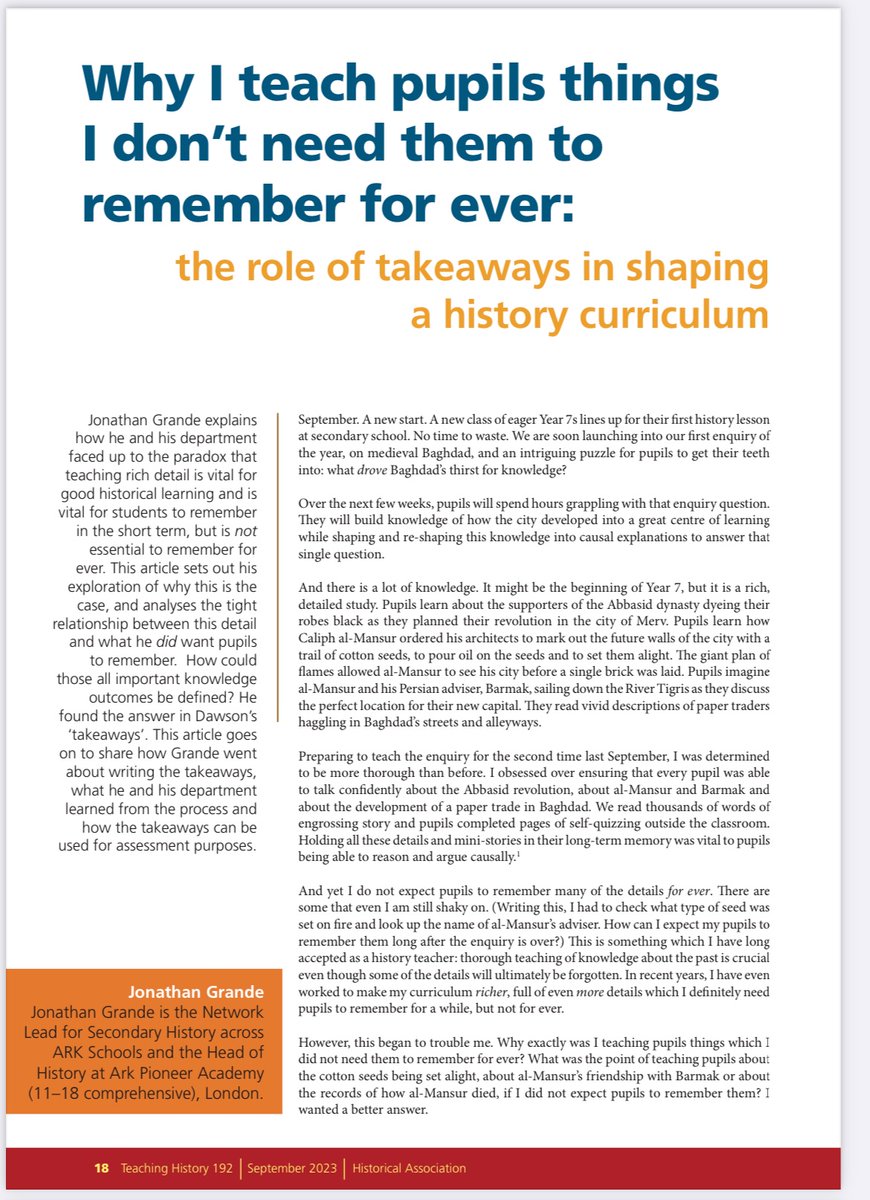
Jonathan Grande
@jonniegrande
Followers
2K
Following
5K
Statuses
5K
Head of History | Trust Lead for History | Blog: https://t.co/yB04VSLbhL
Joined May 2011
Supporting Ss to build substantive knowledge abt the past - rich, deep, lasting knowl that means s’thing & matters to Ss - is vital, but really hard! Delighted to have an article in @histassoc TH192 exploring my journey so far through this challenge.
8
23
113
@historysuperfan @KTG_1990 That’s great to hear, thank you. Would love to hear more sometime about how you use, and especially develop/adapt/improve, them. And always interested in any blind spots, omissions, alternative approaches etc.
0
0
2
@historysuperfan @KTG_1990 Nice! Agree choral response and MWBs super powerful for this. And why I don’t think this part of the learning process necessarily needs to be done in books. (And can be more efficient and interactive when not done in books).
0
0
1
@historysuperfan @KTG_1990 This eg also highlights that the rhythm of a lesson / series of lessons - the particular blend of knowledge building, using this to answer the EQ or related qus, developing & refining an arg etc - will vary from enq to enq. Well aware my initial comments had none of this nuance!
0
0
1
@KTG_1990 @historysuperfan Thanks for your blog! Resonated with things I’ve been thinking about recently, so very helpful to be able to try and organise my thoughts, have them constructively challenged and explore how far they are / are not relevant to other contexts.
0
0
2
@historysuperfan @KTG_1990 Out of interest (and unrelated), what do you do to ensure / check all pupils leave with all this new knowledge in their head? (Sorry, current obsession for me, and really interested in what different people are doing)
1
0
0
@jessielouiseph9 @historysuperfan @KTG_1990 Beautifully put! It’s the substantial ‘application task’ bit I don’t think I would want pupils to do until they have lots in their head to use and think with? Eg planning an answer, writing an argument
0
0
3
@jessielouiseph9 @historysuperfan @KTG_1990 Definitely. Application in terms of pupil thinking (in response to questions) but not necessarily application in terms of task? Is that fair? (I was thinking initially about application in terms of a distinct task)
1
0
1
@historysuperfan @KTG_1990 Absolutely! I think it also highlights the importance of paying attention to what pupils need to know after the enquiry. In my Later Stuart example, I need pupils to know months later: - what the Restoration was - a sense of some of the changes and continuities c1660-1700
2
0
1
@KTG_1990 @historysuperfan I think it depends what we mean by ‘application’, as @historysuperfan said.
0
0
1
@historysuperfan @KTG_1990 Ah right, that makes sense! I was thinking about stuff I’ve done in the past where I’ve just flung some randomly ordered statements at pupils and asked them to sort them, when they know nothing about the events, the period, the vocab etc!
2
0
0
@historysuperfan @KTG_1990 Categorising, debating answers to the EQ etc then further build knowledge in the sense of re-shaping pupils’, giving knowledge new status (e.g. as evidence for a particular claim, or as something contested), increasing connections between knowledge
0
0
0
@KTG_1990 @historysuperfan 2) pupils are expected to hold knowledge in their head throughout every lesson, and are constantly required to ‘retrieve’ (in natural ways) prior knowledge eg ‘let’s just re-tell the story so far before we learn what happened next’
1
0
0
@historysuperfan @KTG_1990 Lots of other approaches, obviously - but perhaps explains some of my comments and should have maybe made that clearer!
0
0
0
@historysuperfan @KTG_1990 If pupils are rushed through to extended writing or categorising ideas every lesson, where they have resources and never have to hold anything in their head - we probably need to put more emphasis on knowledge-building.
2
0
0

